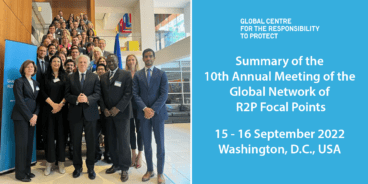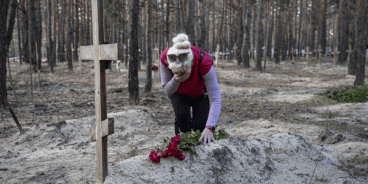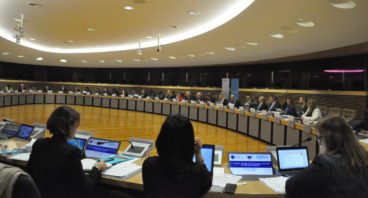
Canada Should Appoint a ‘Focal Point’ for Atrocity Prevention
Op-Ed by Dr. Simon Adams for Embassy Magazine, Canada
For those of us outside Canada and its parliamentary entanglements, the Responsibility to Protect is not seen as a Liberal, Conservative, or NDP concept.
We see it as an idea that is Canadian in origin, in keeping with the country’s long tradition of supporting international human rights, peacekeeping, and in preventing mass atrocities. A Canadian government-funded commission developed R2P and Canada played a role in facilitating its adoption at the United Nations World Summit in 2005.
R2P’s core idea is that all governments have an obligation to protect their population from genocide, war crimes, ethnic cleansing, and crimes against humanity. It is primarily a preventive doctrine. However, R2P also acknowledges that we live in an imperfect world and if a state is “manifestly failing” to meet its responsibilities, the international community is obliged to act. It is not a right to intervene but a responsibility to protect.
Support for R2P at the UN is now almost universal.
Libya and Syria have provided R2P’s biggest challenges to date, but even last year when the “post-Libya backlash” was at its peak, a number of states spoke strongly in favour of R2P at the opening of the 66th session of the UN General Assembly.
Over 30 states also used their statements as an opportunity to call upon the Syrian government to end its attacks on civilians and to call for a unified international response to the crisis.
The debate at the UN now is about how to implement R2P in specific cases, rather than whether such an international responsibility exists.
Focal points initiative
Institutional capacity is also steadily developing, most visibly with the R2P “Focal Points” now being established within national governments and intergovernmental organizations. This is an innovation that I urge Canada to undertake.
This initiative recognizes that the international community needed to move from talking about R2P to taking concrete steps to implement it at the domestic level.
The initiative asks that states appoint a senior official to co-ordinate national preventive and protective strategies. These officials will also collaborate through an international network of R2P focal points to enhance efforts to anticipate, prevent, and respond to mass atrocity crimes in the world.
An R2P focal points organizing group has been formed by the Global Centre for R2P along with the governments of Denmark, Ghana, Costa Rica, and Australia.
Despite the initiative only being at an early stage, 13 governments from Africa, Australasia, Europe, Central and South America have already appointed a focal point. At least another 20 are in the process of assessing guidelines for appointment.
Each government will have to identify for themselves where best to place the focal point, but the ideal appointment is a senior government official who can not only ring alarm bells within government in a loud, clear, and precise fashion, but also has the gravitas to be able to mobilize their government to respond appropriately.
In Canada, as elsewhere, atrocity prevention should remain a non-partisan issue.
Recent controversies regarding Libya, Syria and R2P have tended to focus upon the use of military force, but of course R2P is about much more than that.
We have to be fully conscious of the fact that misuse of R2P debases the concept. Clarity of purpose, proportionality, and precision remain essential. But the crucial element is to strengthen the politics of non-indifference.
For that to happen, we need Canada to continue to raise its voice. As a credible and respected “middle power,” its influence is undeniable.
But while Australia has appointed a high-level focal point and the United States has established an entire inter-agency atrocities prevention board, Canada appears to have abandoned the field.
The Responsibility to Protect is not just a concept to be discussed in the abstract. Right now there are people in Syria, Sudan, the Democratic Republic of Congo, and elsewhere who are continuing to face the reality of mass atrocity crimes. Any response to their plight, diplomatic or otherwise, requires serious and sustained political will at the UN and beyond. R2P should stand for the end of impunity, injustice, and inaction. Nothing more, and certainly nothing less.
Canada still has the credibility and capacity to make a difference in the world today. We need Canada in the fight to prevent and protect people from mass atrocity crimes, not watch from the sidelines.
Related Content


Atrocity Alert No. 318: Ukraine, Syria and the Global Network of R2P Focal Points
